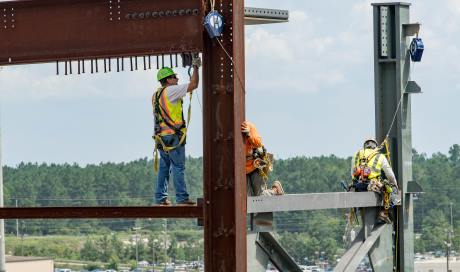Georgia Power expects late August decision on Vogtle
03 August 2017
Georgia Power estimates net additional capital costs of $1.0-1.7 billion to complete the two AP1000s under construction at Vogtle, it said yesterday. It expects to make its recommendations on whether or not to proceed with the project to the Georgia Public Service Commission (PSC) later this month.
 |
| Construction work at Vogtle pictured in July (Image: Georgia Power) |
The Vogtle project is majority owned by Southern Company subsidiary Georgia Power (45.7%), with co-owners Oglethorpe Power (30%), MEAG Power (22.7%) and Dalton city (1.6%). The units will be operated by Southern Nuclear Operating Company. Work had been continuing at the site under an interim assessment agreement since contractor Westinghouse filed for Chapter 11 bankruptcy protection in March, but project management and control has since transitioned to Southern Nuclear after a services agreement between Westinghouse and Vogtle's co-owners became effective on 27 July.
Since Westinghouse's bankruptcy filing the plant's co-owners have been working to evaluate their position and make a recommendation to the PSC on whether to proceed with the completion of both, either or neither of the units, which were 66% complete in May. Presenting Southern Company's second quarter results yesterday, CEO Tom Fanning emphasised that the plant's co-owners have not yet made a final decision on its recommendation to the PSC, but would do so in late August.
Preliminary in-service dates for the units are between February 2021 and March 2022 for Vogtle unit 3 and between February 2022 and March 2023 for unit 4. Georgia Power estimates the provisional cost to complete the project for its 45.7% share, to be $3.9-4.6 billion, with total capital costs for its share of $6.7-7.4 billion. This takes into account money already spent on the project and the guarantee obligations from Toshiba. It means the estimated net additional capital costs for Georgia Power would be between $1.0 billion and $1.7 billion.
The company estimates it would cost it a total of $6.3 billion to cancel the project. This is made up of expenditure on the project to date, financing costs and other costs connected with cancellation, including terminating contracts for construction and other services, and securing the construction site.
Fanning told investors the transition of control had been a smooth one and productivity at the site had improved significantly in the first half of this year. If the project continues, Southern Nuclear plans to appoint a prime construction contractor. He said: "With engineering nearly complete, the primary success factor going forward would be productivity."
Different to Summer
Responding to questions, Fanning said there were a "host of differences" between Vogtle and the USA's other AP1000 construction project, VC Summer, which was abandoned earlier this week by co-owners South Carolina Electric & Gas (SCE&G) and Santee Cooper. He also cautioned against making "apples and oranges" comparisons between the cost estimates for the two projects. "We feel confident in our estimates," he said.
Georgia PSC chairman Stan Wise earlier this week said the Vogtle project may be in a better position to move forward than Summer. "The dissimilarities of these projects should be recognised before making any suppositions on whether construction will continue at Plant Vogtle based on decisions made in South Carolina," he said.
Georgia Power Company has more than three times as many customers as SCE&G among which to spread the rate impact, Wise said. The overall impact of the Vogtle expansion on Georgia’s rates - less than 5% so far - has been significantly lower than the 18% residential customer impact reported by SCE&G. Guarantees from Westinghouse parent Toshiba, which reduce the total customer impact, are $3.7 billion for the Vogtle project and $2.2 billion for the Summer project, he noted. "Last, there are four co-owners underwriting the Georgia effort, whereas Santee Cooper is the only co-owner in South Carolina. These factors suggest the Plant Vogtle project may be in a better position to move forward than the project in South Carolina," he said.
Researched and written
by World Nuclear News